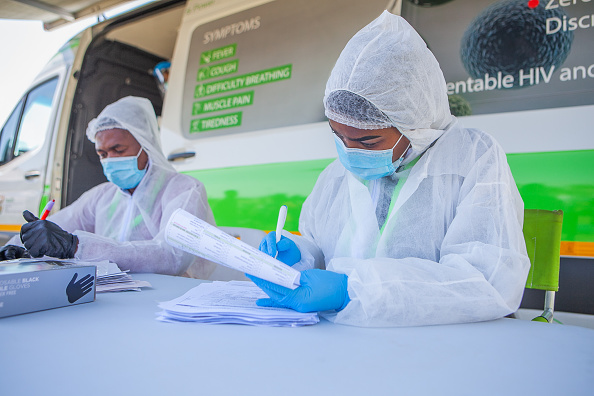Health workers fill out forms at a Covid-19 screening and testing site at Diepsloot, Johannesburg. Picture: GETTY IMAGES / GALLO IMAGES / SHARON SERETLO There is no shortage of innovation in Africa, yet ambitious attempts at systemic change are often characterised by a steady crawl rather than the high-speed agility seen during the Covid-19 crisis. The immediacy of the existential threat requires a different pace.
While the hardware for change has been building over the past decades, the software — such as political alignment and cultural resolve — has sometimes held things back. But the pandemic has shifted the cultural context almost beyond recognition. Suddenly previous obstacles to change are surmountable as bigger ones are overcome, and an ethos of urgent action becomes the norm.
Africa’s challenges as a result of Covid-19 are big. The pandemic has disrupted government revenues, foreign direct investment, development assistance, remittances, trade and tourism — let alone the February oil price shock and its after-effects. There has also been a big impact on small businesses, particularly those involved in the service sectors. Already a minor player in global trade terms, African economies are in danger of even greater marginalisation as a result of a macro trend towards deglobalisation. The postponement of the implementation of the Africa Continental Free Trade Area (AfCFTA) from July to January 2021 delivers a blow to immediate trade prospects and associated socioeconomic benefits.
The silver lining to the crisis has been the fast-tracking of Africa’s digital economy, particularly with respect to e-commerce. This, together with renewed momentum around public-private collaboration, has already bolstered regional resilience to the health pandemic.
My journey with the World Economic Forum (WEF) began in 2006 when the new president of Tanzania had the opportunity to share his leadership vision with regional and global leaders at the WEF on Africa in Cape Town. Subsequently, we launched a public-private co-operation initiative to leverage private-sector investment to transform food systems and smallholder farmers, in collaboration with the forum’s New Vision for Agriculture system initiative. In 2010 the forum held the Africa meeting in Dar es Salaam, focused on agriculture, which culminated in the launch of a pan-African initiative called Grow Africa at the Africa meeting in 2011 in Cape Town. How do we meet these challenges as a unified front? How do we restore or establish resilience? How do we use science, technology and innovation to continue to keep our economies and […]
